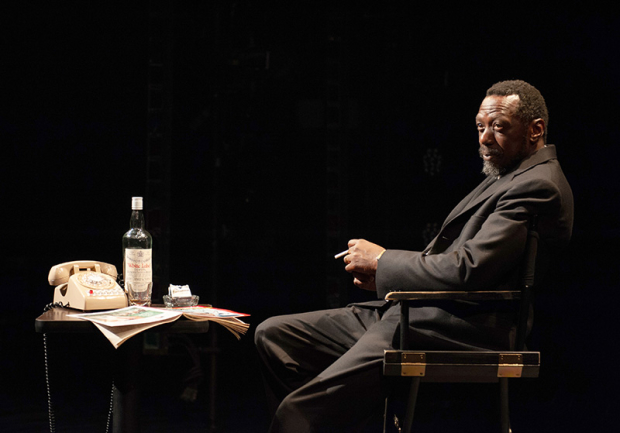Turn Me Loose Is More Than a Laughing Matter
The life of comedian Dick Gregory hits Arena Stage.

(© Margot Schulman)
Comedian and civil-rights activist Dick Gregory's humor and tenacity are celebrated within the intimate space of Arena Stage's Kreeger Theater. After successful runs off-Broadway and in Los Angeles, Turn Me Loose finally makes its way to the city Dick Gregory long called home.
Director John Gould Rubin originally created the idea for the play before handing it off to the very capable and creative hands of playwright Gretchen Law. By combining Gregory's beloved and well-known jokes with stories and sentiments from his many published books, Law crafts a unique, mostly one-man show that's part biography, part stand-up special, and what feels like an honest, raw sharing of wisdom from Gregory to a trusted audience.
Turn Me Loose travels comfortably between Gregory's comedic breakthrough in the early 1960s, his turn towards activism and personal wellness in the early 1970s, the end of his life in 2017, and back again. Gregory truly was the godfather of a kind of honest, intelligent cultural-criticism form of comedy that was unheard of in the early 1960s but is now the standard of stand-up comedy today. The play begins with a white male stand-up comic (played by John Carlin, who steps into several roles) telling the sort of "take my wife" jokes that were popular when Gregory was first stepping onto comedy stages in Chicago. This contrasts sharply with Gregory's humor, which wasn't afraid to tackle racism head-on, even in front of mostly (or all) white audiences. It's an excellent introduction to Gregory's point of view and immediately gets the audience on his side as a truly unique performer.
Speaking of unique, Turn Me Loose hangs solely on the talents of Edwin Lee Gibson as Gregory. While he did not originate the role or perform it in subsequent productions, he owns the part here. Gibson easily embodies the comic delivery and the passion of Gregory to the point where it's hard to see how anyone else could capture the man so well. Not only is he onstage speaking for the entire production, but he time-travels between Gregory's peak energy of his late 20s and early 30s to his 80s with complete believability. With only his voice and stature changing, Gibson moves Gregory back and forth through his life seamlessly. Carlin, in his multiple roles (all white men who are either flat-out-loud racist or clueless), has nice comic timing, but his roles feel slightly superfluous against the laser focus the audience has on Gregory for the entire show.
The set, designed by Christopher Barreca, is appropriately spare, with a few microphones, tables, and stools to designate a radio station, a dressing room, or a stage. Stephen Strawbridge's lighting does an excellent job of helping to delineate the separate spaces. When Gregory is in stand-up mode, the lights illuminate the front of the orchestra section to allow Gibson to engage closely with the audience and give them the freedom of being seen, which empowers them to hoot, cheer, and clap along as one would during a stand-up set. Gibson doesn't allow the audience to be passive and in effect wraps them around his cigarette-clutching fingers in rapt attention throughout.
Turn Me Loose achieves within the play what Dick Gregory seemed to believe about his career and life — that comedy can coexist with social criticism and active thought, that they don't have to be mutually exclusive. Audiences will carry that sentiment with them after they leave the theater, having laughed a lot while also being pushed to think about their own humanity. It's a takeaway that would do Dick Gregory proud.








